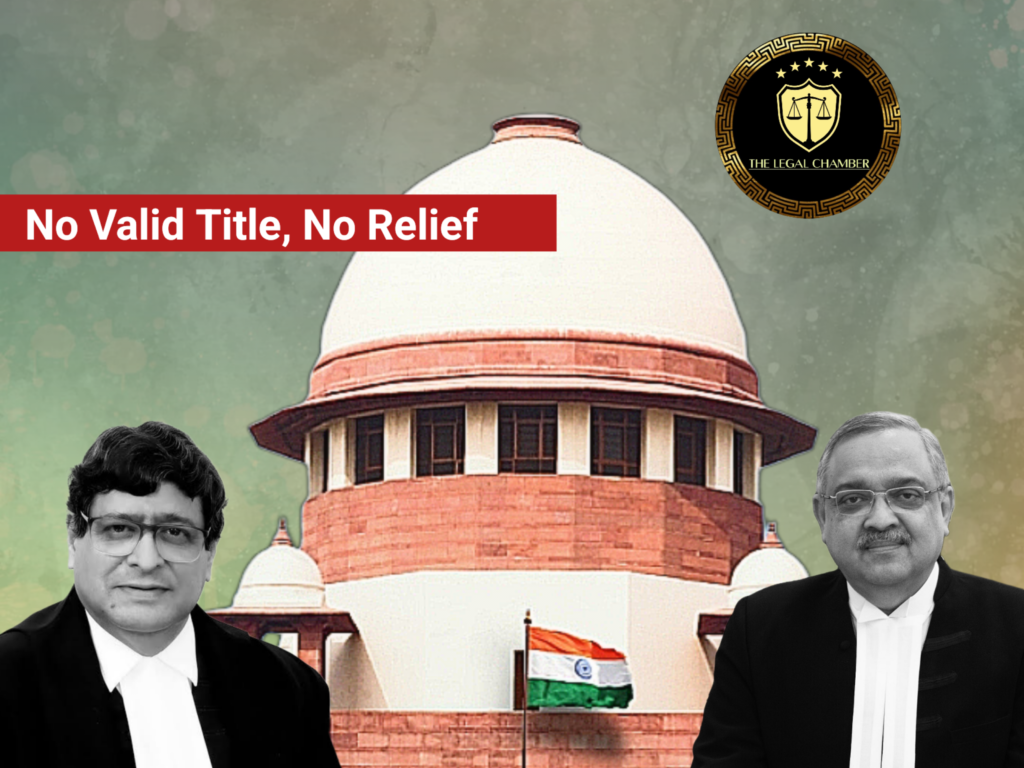
The Supreme Court ruled that unregistered agreements of sale and subsequent revalidations cannot confer valid title under the Registration Act, 1908, emphasizing that only registered deeds of conveyance transfer immovable property rights. It upheld the State’s statutory vesting of land under land reform laws, rejecting claims based on fraudulent documents and unproven possession. The judgment clarified that interim court orders cannot establish lawful possession, and discretionary writ relief under Article 226 is unavailable where title is suspect. The Court reaffirmed the principles from Suraj Lamp regarding invalid “GPA sales” while preserving the State’s right to initiate proceedings under land ceiling laws.
Facts Of The Case:
The case involved a dispute over 53 acres of land in Survey No. 83/2 of Raidurg Pamnaktha Village, Ranga Reddy District, Telangana, originally part of 525 acres owned by 11 individuals. The land was declared surplus under the Andhra Pradesh Land Reforms Act, 1973, and vested with the State in 1975. In 1982, the owners’ GPA holder executed an unregistered agreement to sell 125 acres (later amended to 99 acres) to Bhavana Cooperative Society, which subsequently sold portions to the respondents through registered deeds. The respondents claimed possession and sought writ protection against dispossession by the Telangana State Industrial Infrastructure Corporation (TSIIC).
The Single Judge dismissed their petition, noting the agreement’s invalidity (as the land was already vested with the State) and the dismissal of Bhavana Society’s specific performance suit. The Division Bench reversed this, granting relief based on interim orders. Before the Supreme Court, the appellants (legal heirs of original owners) argued the transactions were fraudulent, highlighting discrepancies between two versions of the 1982 agreement and its revalidation in 2006 without registration. The State asserted its rights over the 99 acres, while respondents relied on Suraj Lamp to validate their registered sale deeds. The Court found the title claims suspect due to unregistered agreements, statutory vesting, and lack of proven possession.
Procedural History:
The procedural history of this case originated with Writ Petition No. 30855 of 2016 filed before the Telangana High Court, wherein the respondents sought protection against dispossession from 53 acres of land by TSIIC. The Single Judge dismissed the petition in 2016, finding the respondents’ title claims dubious due to: (1) the land’s prior vesting with the State under land reform laws; (2) inconsistencies in the unregistered 1982 sale agreement; and (3) dismissal of Bhavana Society’s specific performance suit. In 2019, a Division Bench reversed this decision in writ appeal, granting relief based on interim orders from connected cases (WP Nos. 29547/2011 & 4466/2012) that had restrained demolition.
The appellants – legal heirs of original owners and other claimants – approached the Supreme Court through Special Leave Petitions (SLP(C) Nos. 1866/2024 et al.), which were converted to Civil Appeals. The Supreme Court in its May 2025 judgment restored the Single Judge’s order, holding that the Division Bench erred in relying on interim orders to establish possession and overlooking statutory vesting under land ceiling laws. The Court emphasized the respondents’ failure to prove valid title through registered instruments or physical possession, while reserving the State’s rights to initiate fresh proceedings under the Land Reforms Act.
Read Also: Supreme Court Mandates Full Document Disclosure by Enforcement Directorate at Complaint Stage, Strengthens Fair Trial Rights